The Seven Immutable Laws of Bubbles: Example, Housing Markets in USA, UK & Dubai
Housing-Market / Liquidity Bubble Jul 17, 2009 - 12:48 PM GMTBy: Andrew_Butter
 The cycle of bubble and bust in housing is drawing to a close. For many the ferocity of the bust and the collateral damage that followed was a shock, but bubbles and busts are not new; chances are there will be more.
The cycle of bubble and bust in housing is drawing to a close. For many the ferocity of the bust and the collateral damage that followed was a shock, but bubbles and busts are not new; chances are there will be more.
I got interested in bubbles in early 2008 trying to figure out why my model of real estate prices that had worked perfectly for ten years was saying that prices in Dubai which is where I was at the time, "should" have been 30% less than where they were.
This is what I found out:
Law #1: All bubbles need a catalyst, like a stone to throw into a still pond.
Bubbles start in "good times", typically GDP is going up and people have money to spend and invest, so money starts chasing assets and if it takes time for the supply of those assets to increase, prices go up.
For example, the fundamental price of housing long-term is exactly equal to nominal GDP per house divided by a function of long-term interest rates (http://www.marketoracle.co.uk/Article6250.html). When nominal GDP goes up a lot faster than the supply of housing does, then the price of housing goes up; that's supply and demand, there is nothing wrong with that but it's the pebble in your hand; just you didn't throw it yet.
Law #2: Easy Money
Years ago I was friends with old man from Texas, he had a big silver buckle on his belt and crocodile-skin boots, and he used to eat three fried eggs, a slice of steak, for breakfast, extraordinary! Lovely guy; full of stories, he had a sidekick called Ron, and Ron wore "Blues Brothers" shades, and never said a word. I was just a kid and he was like in that Jerry Jeff Walker song..."Desperado Waiting For A Train" which he used to play on his car cassette-player over and over; it was that long ago. Anyway he'd been through the S&L and well, let's say, he was a long way from home.
One day I asked him "what happened"? He said "Son"...when he was being serious he always used to say that..."Son when the money starts chasing the projects not the projects chasing the money, that's the time".
If credit is available at less than the asset price inflation, people who participate can make money from nothing, and the reason they buy becomes less about getting something they want and more about playing that window.
That draws more money to compete for the already limited supply of assets, that's the start of the bubble, like the stone thrown into a pond.
Law #3: Greed starts bubbles, fear drives them.
In every bubble the "Early-adopters" make fortunes, but they are the minority; the real drivers of every bubble are those who came late, that's the way pyramid schemes work; for every winner, there has to be a sucker. Greed of course plays a role, in the beginning the maxim is "those who snooze loose"; then comes fear.
In the recent housing bubbles in USA and UK, ordinary people watched in horror as the price of a home spiralled out of their reach. The option was join the circus, or downgrade; in America what that often means is moving to a neighbourhood with lousy schools and violence.
America more than perhaps any country in the world is a carrot and stick society. Much is said about the "carrot", but the stick is just as big an incentive; lose you "medical" and you join the "deadbeat" class.
Wherever you look it up, the standard definition of a valuation says something about market participants acting "knowledgeably, prudently and without compulsion"; greed affect that equation a bit; fear affects it a lot.
Law #4: Knowing the price of everything and the value of nothing.
Ask anyone from Generation "X" what's the value of something and he will tell you "that's the price I can get someone dumber than me to pay". There is another way to value things (or services), and that's the price someone smarter than you will pay.
When those two prices are not the same the market is in what International Valuation Standards (http://www.ivsc.org/) calls, disequilibrium. George Soros has another word for that he, calls it market mispricing.
Dumb valuations are an essential component of any bubble, first because they convince the suckers to pay, and second because they convince banks (and all the rest), to keep on supplying the credit, which is the essential lubricant of such perpetual motion machines, and when the bankers start lending money without understanding value, that drives the bubble forward.
Lending money against collateral is of course not a new idea; the trick, which gets forgotten from time to time, is that it's a good idea to make sure that what you can sell your "pound of flesh" for, will be more than the loan you wrote. "Will" is the operative word there, knowing what you might have sold it for yesterday (i.e. mark-to-market) doesn't help; the price you can reasonably expect to sell it for anytime in the future is called the "smart" price.
That's what IVS calls the "other than market value", which they mandate you should report when the market is in disequilibrium.
A big part of the problem was that neither banking regulators, nor the Basel II guidelines, nor the accounting profession recognise IVS (notwithstanding that it is accepted by every valuation institute in the world of any consequence).
That's what Chairman Bernanke calls "pro-cyclical" although he appears to only understand how that affects valuations after a bubble. Building up to a bubble the more money that is lent, the higher prices go, which means that even more money can be lent.
Combine that with the convention that the moment in time you lost money after you wrote a loan to someone who had no intention of paying it back, was not the moment you handed the money over, it's the moment that you realise (a) you aren't getting your money back and (b) that the price you can sell the pound of flesh for, is less than the money you advanced; and the mix can get explosive.
The operative word there is "realise", and if you don't realise, well you can still call it an asset; that's the reason bankers, accountants, banking regulators, and rating agencies are so determined to know nothing about valuation, because if they did, then they would have no excuse. So the result is that it’s "safer" to proceed boldly forwards in blissful ignorance, and the ultimate driver of a bubble, is ignorance.
Law #5: The fatal seduction of New Paradigms.
Remember the Dot.com boom? They had these complex formulas for how you could value a company that had never made even an approximation of a profit, let alone had a coherent business plan.
Of course that was a "New Paradigm" with some magical new powers, like the Tulips in Holland all those years ago, and that's why the "Old Rules" did not apply anymore, at least that's what everyone thought.
Ultimately it's all about valuation, and if something is new, it's harder to do a valuation.
Dumb valuation is easy, you just follow the herd, but doing a smart valuation is harder, you are supposed to get hold of "sufficient" historical market-derived data, and show that in the past this data could be used reliably to arrive at the price from independent market drivers. What that means is that you can't just do a plot of price against time and assume that because in the recent past price correlated with time, that's how it will be in the future, time is not a valid market driver.
When the geeks start plotting daily prices for three years and declaring that "Eureka" price correlates with time with a 95% R-Squared, you got a problem.
Law #6: Judging the "Pop".
When I was a kid I used to go surfing, you learned the hard way to figure when a wave was going to break (hard like being bounced along the coral), a wave of a certain height breaks in a certain depth of water, so the big ones break out further than the small ones, and they come in sets of seven. And when it hits its depth, then bang!
Judging the pop is the hardest part, typically the wave builds up to a peak then inside it starts rolling over, but you don't see that; it's like the last gasp, but when the rate of increase starts to drop, that's the time.
Law #7: The amount of wealth created by a bubble is always less than zero.
Bubbles create no long-term economic value. Often they encourage people to borrow to spend money on luxuries, rather than investing in capability that might in the future create value that could be used to pay back a loan, for example an education, a technology, a franchise...etc. That "waste" is how bubbles often end up destroying economic value.
The reality is that it's impossible to create wealth from nothing, that's just re-stating the Second Law of Thermodynamics.
Of course some people make money, but that's just a redistribution of wealth, and in that regard, the recent Bubble and Pop in housing probably represents one of the greatest re-distributions of wealth in the history of mankind (mainly from poor people who got into the pyramid late only when lending standards dropped, to rich people who got in (and out) early and had the advantage of good credit scores).
The interesting thing about that is the amplitude x the period of the mispricing on the high side, is typically exactly reflected in (the amplitude x the period) of mispricing on the low side.
What that says in effect is that a bubble and bust is a zero-sum game, and in the end no wealth is created, which is another way of re-stating the "efficient market hypothesis"; i.e. that mispricing up must be balanced by mispricing down.
One way of looking at that is the pebble thrown in the pond, the amplitude and periodicity of "up waves" is typically exactly mirrored in the amplitude and periodicity of the "down" wave, the net result is zero sum.
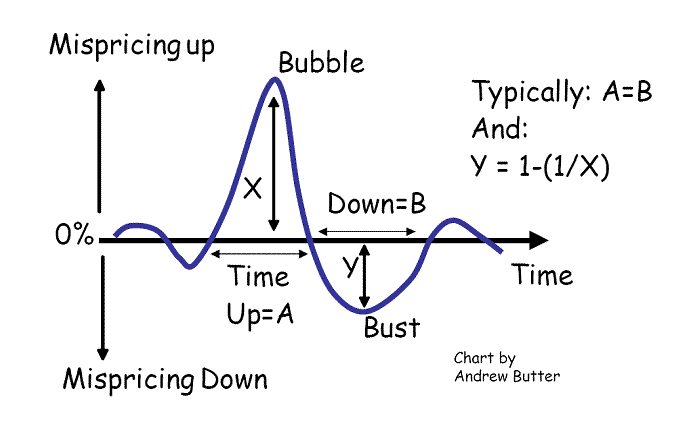
The reason that the "down" wave is (1-/"up") is because if you go from 100 to 140 that's a 40% increase, if you go from 140 to 100 that's a (1-1/1.4) = 29% decrease.
There is nothing really new there, everyone knows that "markets overshoot" (Farrell's Second Law); in the language of "efficient market hypothesis", if markets revert to the mean well that presumes at some stage they must have diverted from the mean, although what a lot of people don't get is that's both up and down.
What I suppose is new, is the symmetry and predictability of it. I only saw that when I worked out other-than-market (smart) value compared that to "dumb" value and plotted a timeline; the predictability is uncanny, and not just for housing.
That's the theory - how about the reality?
The recent bubble and bust in housing worldwide provides a nice clean example of the dynamics of nature at work.
I used Dubai as one of the examples mainly because I was there, from 2003 to 2007 as part of the herd, and from then on sitting on the beach watching in bemused wonder; I didn't really predict the crash, certainly not the severity, at that time I wasn't really confident that the model worked, but at least it had told me to stay out of range.
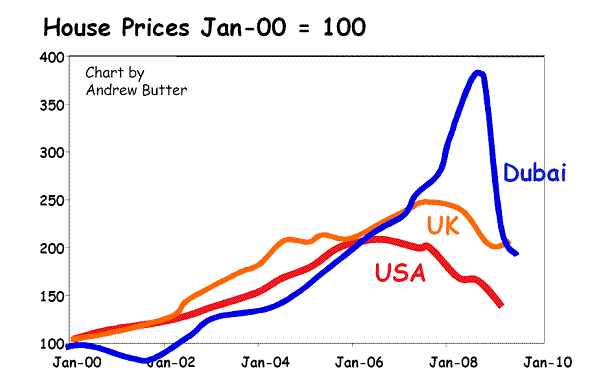
Law #1: The Catalyst
In USA and UK the catalyst was the natural readjustment of prices up from the slump that followed the S&L in USA and the Lawson Boom in UK. This bottomed in about 1995; the history of mispricing of these markets (explained in http://www.marketoracle.co.uk/Article6250.html), is illustrated here:
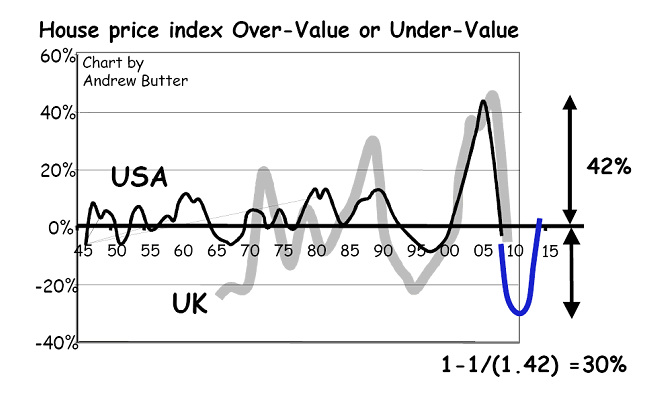
So from about 1995 in UK and 1997 in USA house prices started to "recover" from the mispricing below the fundamental, the danger of that is the increase of prices is more than GDP and people misread that; the correct thing to have done would have been to slam on the breaks as the line crossed the equilibrium; which might be worth bearing in mind in about 2014.
In Dubai it was different, what happened there was that the huge rate of economic growth vastly outstripped the capacity to build new housing, and the growth was enormous:
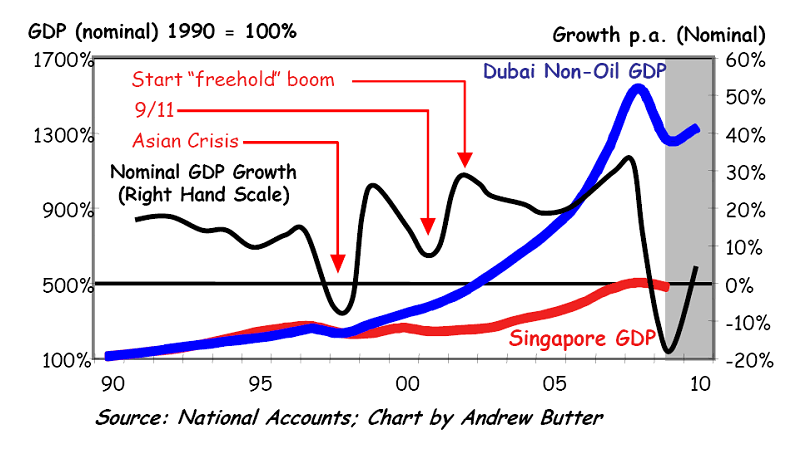
In 1990 the economy of Dubai was 15% the size of Singapore, in 2008 it was 40%.
The economy measured in nominal Yankee Dollars was fifteen times bigger in 2008 than it was in 1990 (some analysts (including this one), think it grew quite a lot faster than the "official" numbers show, certainly proxies for growth went up faster).
Why the Dubai economy works (or worked) is another story, but it wasn't real estate that started the boom, the real estate was because the economic business model was sound, (still is).
Sure there was inflation, but that's irrelevant for property prices, what matters there is nominal GDP. And sure, like anyone who is running real fast (and telling everyone about it), Dubai has many detractors, some say "Ah but that wasn't "real" economic growth, that was just inflation".
But that doesn't wash, Dubai is a totally open market where the business model is to import everything (food, cars, brains, brawn), then rework those and sell them on, it's hard to construct an argument that inflation outside of real estate was any more than what it was in the world in general. If the price of steak from Europe goes up, well you buy from New Zealand, if Brit brains get overpriced; well you just buy brains from South Africa or Romania (just as good).
I figure "real" inflation averaged about 7% from 1990 to 2008 so the "real" economy possibly grew by 10% a year "real", but there are no reliable numbers so that's just guessing.
The point is that from 2000 to 2005 nominal GDP went up by 137% (yes the economy (nominal) more than doubled in five years), but the housing supply only went up by 48%. Go figure what happens to the price!
Those were the catalysts; to get a bubble all you need to do is light the blue paper.
Law #2: Easy Money
A nice illustration of the effect of credit as a driver of house-price bubbles is UK which is very fond of bubbles (they had three in the last fifty years).
This is a plot of the mispricing of housing in UK (dumb value compared to smart value) against the difference between the change in house prices and interest rates.
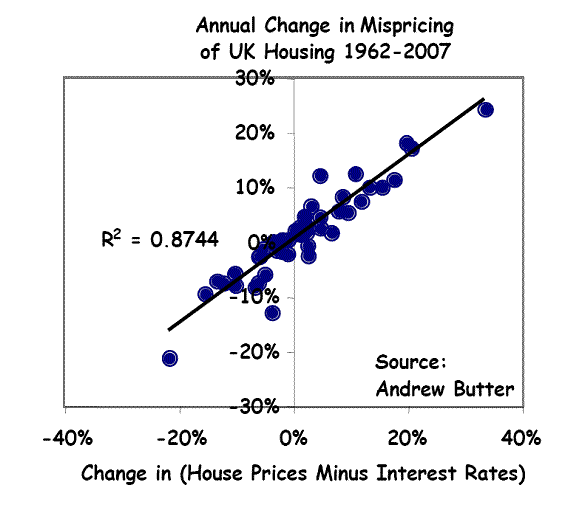
Only in America
The only person who is actually claiming credit for the credit crunch (no pun intended) is the guy in the cave; Allan Greenspan says it wasn't his fault; and sure there is an idea that it was all the fault of bankers being greedy, but that's not new.
Greedy bankers are as old as the hills; a fundamental Law of Quantum Physics says that bankers exist in two and only two distinct quantum states, extreme greed and extreme terror, that's written down in stone in the General Theory of Relativity right after the bit about QTM (I think?).
In the absence of anyone putting up his hand and saying "I was the one who caused the world financial system to blow up" (apart from you-know-who), the default consensus explanation appears to be that it was a Black Swan. Although from where I'm standing that thing looks suspiciously like a Black Duck, so my money's on the guy in the cave.
That's a theory of course, but regardless of who claims credit for it, the "stone thrown into the pond" was the dramatic drop in the base rate after 9/11, which coincided with a time that house prices were going up "naturally". So you could borrow at less than house price inflation, and Ka-Boom!
The Story in Dubai
Credit played a part in the bubble in Dubai, but it wasn't the main reason, well at least outside of the fact that a lot of the growth was fuelled by credit, and because in Dubai the price of credit was (is) tied to the dollar, so effectively the core of UAE monetary policy, was (and still is) decided in Washington DC. So when house prices were going up 40% a year, you could borrow at 5% to 6%, and only get 2% on deposits.
But typically LTV was never more than 70% (although some people double-geared using personal loans); a good part of the bubble was fuelled by cash, (plus a complex options trade in off-plan called "buyer groups" which was basically a type of Ponzi sub-scheme).
A big driver was something else, although it was still about valuations. In Dubai the key piece of misinformation was that market participants assumed that the rent you could get for a new property was the market rent. That's logical, you see a nice villa on The Palm going for $3 Million, you know you can rent it for $175,000, that pays the mortgage and you can sit back and wait for the price to go up, so that's a no-brainer...right?
The way that worked in Dubai, was that the residential property market was and still is, a huge multi-family rental market, 95% of the jobs in the private sector are held by foreigners "resident" on three-year work visas. And the "workers" rent; only a very small proportion of "freehold" housing units are owner-occupier, sure plenty of residents bought, but most couldn't afford to live in the places they had bought.
What happened was that the economy was growing at 27% nominal, new supply was growing at about 10% so the "fundamental" (GDP/Unit) was growing at about 15% (and if LTIR stayed the same that's how fast the market prices should have gone up (in fact that effectively went down too but that's just detail)).
But there was rent control on existing (leased) property, so all the new demand was accommodated by the new supply.
That way two markets were created, one for incumbents (90% of supply going up at an average of about 7%), and one for new arrivals (27% GDP growth sucks in a lot of those), comprising 10% of supply going up at 30% to 40% a year.
That is of course unstable and the bubble in the overpriced sector can only last so long as either GDP keeps growing or until new inventory arrives.
Law #3: Fear and Greed
In USA and UK the fear was being left out in the cold if you didn't "get on the ladder". Intriguingly part of the cause of the bubble in USA (and to some extent in UK), was that financing was made more available for poor people to own their own homes. That increased the competition to buy new homes, stoking the bubble. I suppose no one thought that if house prices doubled that might make it harder for poor people to own their own homes and that a more sensible approach might have been to build social housing thus increasing supply and pushing down prices. But that would have been much too logical.
In Dubai the element of fear was with the foreign buyers, mainly people living in unstable countries with crackpot governments, for example in Iran, Pakistan, and Russia (there might be a case to include a few other countries on that list but I'm not going to say which).
For people like that Dubai represented (and still represents) a bolt-hole in case everything blows up in their own country, and one important issue is that people like that have a problem getting visas to anywhere that has a modern infrastructure, security and some semblance of the rule of law (particularly when things actually blow).
Dubai is the easiest place to get a visa to come to in the world, and it doesn't matter if you are black or white or brown or green, or even if you got two left feet, rich or poor, no matter; that sweet young thing at the airport all covered in black with just the eyes showing, will flutter those eyes, and say "welcome" and stamp your passport.
Although I was born outside the fence the keeps what Americans call "aliens"...out, I have a British passport, if you got one of those you can go just about anywhere, you don't notice how hard it is for the "rest".
For people like that Dubai represented an insurance policy, (plus hopefully a decent return on investment, but that wasn't the main consideration). Dubai as city works just as well and in many ways better than New York or London, and a big plus is that it's slightly less boring than Singapore.
It was fear of the unknown that drove those investment decisions as much as anything, and much of that investment was cash.
And there was a lot of cash, according to the Financial Times, in 2008 Dubai attracted $21 billion of FDI, that's more than London and almost as much as the whole of India ($32 billion), much of that went into real estate (and a good portion of that was lost in the bust). That's easy money.
Law #4: The Sweet Seduction of the New.
Of course housing is not new at least in UK and USA. The New Paradigms there were mortgaged-backed-securities and insurance on those (Credit Default Swaps), and predictably those were valued incorrectly by the market participants.
The reason those assets are "toxic" is that people paid too much for them, and the reason the CDS are such a potential nuclear bomb ($50 to $70 trillion worth), is because they were sold too cheap, that's a mistake in valuation that often happens with new products.
What was also new was the new idea of the Quantum Theory of Money (QTM) which was somehow sold as "quasi-scientific", that's why the key formula was made to look like E=MC2 and what "quantum" has to do with it, except to make the name look sexy, I will never understand.
But unlike "science" that new idea was never tested or proven before it was implemented, and in the event it failed, twice; miserably...disturbingly that's still the mantra being chanted by the same captains of the Titanic that "wreaked the family station wagon" in the first place.
The first time QTM failed was after President Nixon defaulted on his debts, and the result after a few years of the liberating genius of monetarism combined with crass Keynesianism was a burst of inflation.
That was "fixed" by "Inflation Targeting"; which was the idea that failed even more catastrophically just recently. In USA that probably had a lot to do with the "new" ideas introduced in 1987 and particularly in 1999, in UK they also changed the bowling.
The logic there was perfectly explained by Allan Greenspan that well if steak becomes expensive you can eat hamburgers, so that's not inflation. And presumably if beef-hamburgers become more expensive you can mince up rats, all the way down to cockroach soup. Marie Antoinette had a similar idea when she said, "let them eat cake", and look what happened to her. Another clever idea was to work out how much 70% of the population (the rich ones) were paying for "shelter" in their owner occupied housing, by tracking how much 30% of the population (the poor ones) were paying in rent, a master-stroke!
Third time lucky perhaps?
What was "new" in Dubai was the idea of "freehold", which was the word used for enclaves where foreigners were allowed to buy. In terms of the rental market these were indistinguishable from the rest of Dubai, just foreigners could own (although the laws weren't actually in place to detail how that happened, small detail).
The point was that first most of the new properties were "freehold" so they got the "new rents", and second misconception was that some wacky ideas started floating around that the value of this new product was somehow comparable to London, New York or Moscow. What's wrong with that idea is that in established cities there are limits on how much new supply can come on line, in Dubai, surrounded by desert plus a shallow sea (maximum 12m) that allows reclamation, there is effectively no limit.
Anyway, that "new" idea got mispriced, the right price is slowly being discovered as all the "old" rents go up and the "new" rents go radically down. Yields are pretty much constant.
Law #6: The "Pop".
Mistime the pop and you end up bouncing on the coral and the only way you know where is up is when you hit something hard (it's the other way).
It looks like you can tell what's coming like you can with a wave, when the rate of increase in mispricing starts to turn close to zero typically that's the sign; here is the history of mispricing in USA and UK:
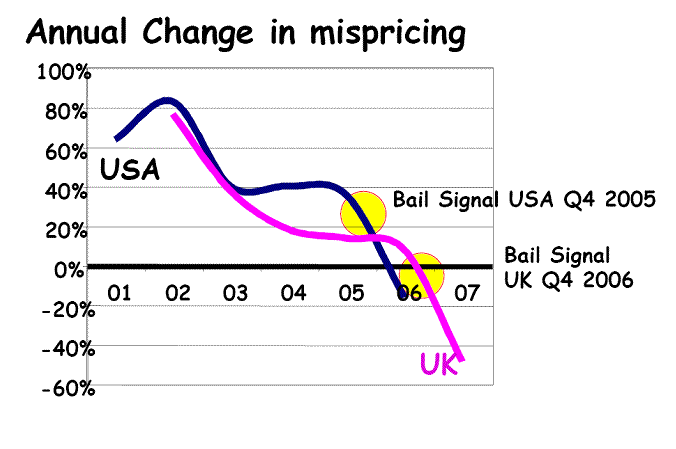
In Dubai, the way I figure it, the actual mispricing was only about twenty months, prior to that it was just supply and demand, it's hard to track because the data is hard to find and you have to work a lot of things out on your own - this is my estimate, it could be wrong:
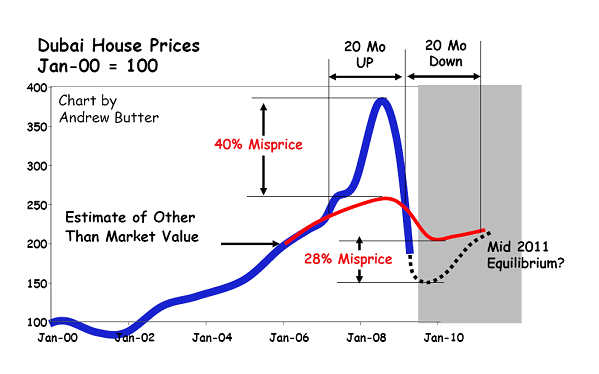
There were other factors in Dubai, notably that a lot of the growth from 2004 to 2008 was because of infrastructure development financed by debt (according to Moody's $80 billion of it, which is an extraordinary number given that GDP when the debt started to be drawn down was about $40 billion - put that amount of "stimulus" into USA and that would be about $25 trillion over four years).
When the credit crunch hit there was a problem rolling that over, particularly since much of it was short-term, that started to slow things down, a lot.
Another possible reason was that the government changed it's mind about the visas, previously if you bought a "freehold" property you could get a residence visa, which for anyone who lived in a place with crackpot governments was a free get-out-of-jail card. In mid 2008 it was announced that they didn't really mean that.
Plus the inventory started to come on line, end 2007 there were 286,432 occupied housing units in Dubai, end 2008 there were 336,341.
OK that's "only" a 17% increase which shouldn't have mattered when the economy was growing at 27%, but that represented more or less a doubling of the "new" stock, which was the part of the market that everyone was watching.
It's hard to know which of those was most important because they all happened at the same time, either way the dynamics of the pop were different from UK and USA, and it was harder to call because at the time, no one knew that the government had taken on so much debt (or that it would have a problem rolling it), and no one anticipated they would change the rules on the visas.
Law #7: Working through Zero Sum
Looking at the size and timing of the mispricing in the bubble you can more or less figure the size of the overshoot. In UK and USA the bubble lasted about seven years so if the market-long-wave idea works prices should be at equilibrium in about 2013 to 2014 and right now they are 20% to 30% mispriced on the low side.
Of course exactly where prices start to turn will depend on where nominal GDP and long-term-interest rates go, at current consensus projections for GDP and long-term interest rates that gives a peak to trough in USA at 40% and UK at 33%. The reason UK is less is because (a) they reacted quicker comparatively (they had the benefit of seeing what was happening in USA), (b) the amount of new inventory was less.
The recent up-tick in UK confuses me, either it's an illusion (http://www.marketoracle.co.uk/Article10895.html), or the UK inflation is a lot more than is being reported; that wouldn't be the first time. Given the decline in the value of the pound over the past year, it's quite possible inflation was imported. And of course inflation is the saviour of the imprudent; and if you can have inflation by stealth, so much the better.
But either way, unless the economies collapse completely (I'm not qualified to judge that but my gut-feeling is that's unlikely and the bounce in stock markets (which are in line with market-long-wave dynamics (http://www.marketoracle.co.uk/Article10604.html)), suggests that some companies are figuring a way out of the hole. Assuming say 2% nominal GDP from here on that could translate into 9% to 11% increase in prices per year from whenever the bottom is reached, which I reckon will be latest within a year. So right now, it's likely that pockets will start to emerge where it makes sense to buy.
In that context the 125% LTV that is being talked about in USA and that Nationwide (a UK mortgage provider) is offering to existing customers in UK is not crazy; in fact it is smart. The point is that a foreclosed house will always fetch less than one that is sold "after proper marketing", and if a 125% mortgage can keep someone in his home until the mispricing down dissipates, that can work. But you have to wait until you are pretty close to the bottom before doing that.
When prices are 20% to 30% less than the "smart-value" it's safe to write 125% nominal LTV, (as opposed to when the "smart" value is 70% to 80% of the "dumb" value like in 2006, when it was very much not smart).
One thing the architects of the new regulations are not talking about is mandating what LTV should apply, (apart from Gordon Brown who suggested that right now mortgages shouldn't be more than 85% LTV which is precisely the wrong approach at this point in the cycle).
If governments tracked the mispricing they could control bubbles that way, which would have the advantage of allowing them to use the blunt instrument of interest rates to nurse the economy, without worrying about asset price inflation and the damage that can cause. And in 2004 if the governments or the regulators had mandated that new mortgages could not be more than 70% LTV, there wouldn't have been a credit crunch.
I don't think that the level of foreclosures has anything to do with the way bubbles dissipate, the price has to go down to the place the market re-starts, how it gets there, and how much pain there is irrelevant to the inevitable progression of the long wave. And I don't think the re-sets will make much difference either.
One ray of light is that historically there is a strong negative correlation between investment in equipment and the extent of market mispricing (read real job creation rather than creating public sector jobs which is where most of the jobs in UK were created over the past five years). That's logical, mispriced housing makes it more expensive to operate, so new jobs get created elsewhere, one more reason why allowing property bubbles is pure undiluted irresponsible lunacy.
Dubai is complicated by the fact that so much of the economy was linked to construction, which has now ground to more or less a halt. Plus the fact that the rate at which money was being pumped into the economy (debt and equity), has gone down to about zero.
I wouldn't be surprised if GDP in 2009 ends up about 75% of what it was in 2008, given that the misprising "up" was 40% (so a mispricing of 28% "down" is likely, that translates to an average peak to trough of about 60% in the "freehold" sector (that's sketched on the chart).
But the cycle will be swifter, and Dubai's core business model is robust; I figure the bubble was about 20 months so equilibrium should be regained about mid 2011, at that point prices will probably be 40% down on the peak (due to the hit to the economy), but even so that suggests perhaps a 20% rise on the bottom which I reckon happened in about April. I suspect now decent property in Dubai might be a buy although since a lot of it thrown up so fast without any thought as to functionality or design, good stuff is hard to find.
By Andrew Butter
Andrew Butter is managing partner of ABMC, an investment advisory firm, based in Dubai ( hbutter@eim.ae ), that he setup in 1999, and is has been involved advising on large scale real estate investments, mainly in Dubai.
© 2009 Copyright Andrew Butter- All Rights Reserved
Disclaimer: The above is a matter of opinion provided for general information purposes only and is not intended as investment advice. Information and analysis above are derived from sources and utilising methods believed to be reliable, but we cannot accept responsibility for any losses you may incur as a result of this analysis. Individuals should consult with their personal financial advisors.
Andrew Butter Archive |
© 2005-2022 http://www.MarketOracle.co.uk - The Market Oracle is a FREE Daily Financial Markets Analysis & Forecasting online publication.



